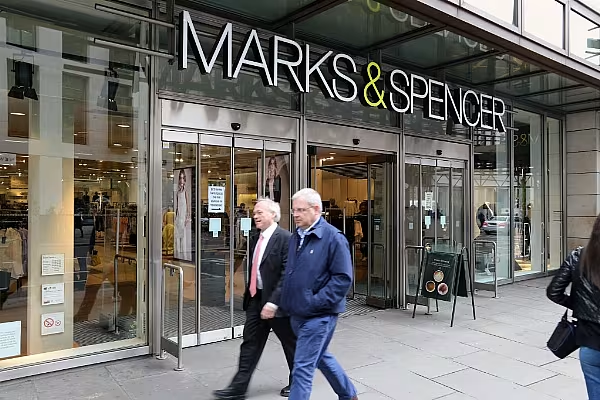UK retailer Marks & Spencer has reported a 7.6% like-for-like decline in revenue in the third quarter of its financial year, with a 2.6% increase in food sales offset by a 24.1% decline in clothing and homewares.
“Given the on-off restrictions and distortions in demand patterns our trading was robust over the Christmas period," Steve Rowe, M&S chief executive, said in a statement.
Here's how leading industry analysts viewed its performance.
Richard Lim, Retail Economics
"Clothing and home sales were dealt a sharp blow against the backdrop of zig-zag lockdown policies over the Christmas period. But as shops were forced to close, consumers embraced the online channel which saw the retailer deliver impressive growth. It's taken some time to get the online channel fired-up, but the retailer appears to have benefited from a wave of new online shoppers.
"Performance across the food business was disappointing given that many shoppers were looking to trade up given the restrictions. Many households have seen a significant boost in discretionary spending power as cancelled holidays, less commuting and fewer evenings out have forced families to save, especially the most affluent. This is the traditional M&S heartland and it appears consumers have decided to treat themselves elsewhere."
Emily Salter, GlobalData
“M&S has reported a tale of two halves, with a healthy performance in its food division managing to prop up total UK sales of £2,529m while clothing & home floundered, paying the cost for its inability to adapt fast enough to changing shopping habits. After a terrible Christmas for clothing & home in 2019, 2020 leaves little to be desired despite an improved performance compared to H1 (-40.8%).
"M&S’ recovery is slow versus other apparel players as it continues to be hurt by an online platform unable to make up for lost store sales (-46.5% in the period), unlike competitor Next due to its agile market-leading online proposition, and a lacklustre product offer.
“The retailer’s focus on value in food has started to pay off, with decent sales growth especially considering dampened footfall on high streets and that many of its travel hub locations will have been closed. M&S’ focus on value is smart, especially considering the COVID-induced financial insecurity faced by many consumers, but it is something it cannot compete with the likes of Tesco on, so it must showcase its more unique, innovative products too. Its partnership with Ocado will have boosted sales and will become even more important as the UK endures another lockdown."
Russ Mould, AJ Bell
“Against such a difficult backdrop, Marks & Spencer’s third quarter performance is far from a disaster. Food sales were the saving grace with the Ocado joint venture being a lifeline for the group, giving it much-needed online delivery capability at a time when so many people want to order via their phones or laptops rather than risk going to crowded places during the pandemic. One can imagine a very different set of numbers had M&S not done that deal with Ocado.
“Clothing sales are still disappointing, and the business is clearly suffering from the change in society, whereby demand for smart dresses and sharp suits will have fallen off a cliff.
“At some point that will return, until which M&S must rely on demand for pyjamas and running kit to keep the tills ringing. Fortunately, it has a good reputation for quality products in both these areas, so management must avoid mistakes of the past and ensure there is adequate stock in all the popular sizes. This business seems to have been in turnaround mode for what feels like an eternity, yet the past year has seen some big steps to reshaping the group.’
James Anstead, Barclays
"The subsequent deceleration is not a surprise given the forced closure of non-essential shops in the subsequent nine weeks (5 Nov to 2 Dec across England; 20 December to present in London and South England).
“Near-term trading remains very challenging” – not surprisingly. Clearly M&S’s sales suffer in a lockdown scenario so the new restrictions are likely to be unhelpful for sales and gross profit. Some staff are on furlough, but far fewer than in the first lockdown; ii) Full-price Clothing & Home sales fell by -4.8% (much less than overall decline) – clearly positive in terms of gross margin; iii) tariffs and administrative costs related to Brexit will have significant impact on M&S’s businesses in Ireland, Czechia and the French franchised business – but M&S is working to mitigate."
Clive Black, Shore Capital
"Marks & Spencer has issued what we deem to be robust Q3 FY2021 trading update with sales in both Clothing & Home (C&H) and Food coming through better than we and, consensus, anticipated. C&H like-for-like (LFL) sales fell 24.1% (SCM; -28.0%) with Food up by 2.6% (SCM; 1.0%). Pandemic related controls conditioned the trading environment, but 47.5% online C&H growth is encouraging whilst Ocado Retail trades well.
"Lockdown 3.0 will negatively impact Q4 FY02021 trading (c£25m per month), but the Group is progressing at pace, we note a clean stock position and the successful £300m bond issue; year-end net debt should be down yoy. We aim to issue FY2021 forecasts shortly but anticipate FY2021 profitability (pre-lockdown 3.0 consensus, £130m)."
© 2021 European Supermarket Magazine – your source for the latest retail news. Article by Stephen Wynne-Jones. Click subscribe to sign up to ESM: The European Supermarket Magazine.














